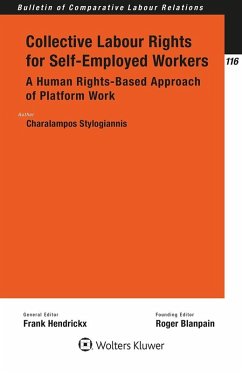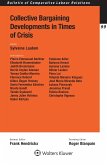Platform work arrangements are often defended as an expression of technological progress with the potential to enable people to work as self-employed individuals, often without any supervision or control. However, by now, it is well-documented that platform work not only shares important features of flexibility and precariousness with other casual work arrangements that are on the rise around the world, but it also entails the risk of excluding a significant portion of workers from the protection of fundamental collective labour rights, including their coverage from collective agreements. In this important and timely book, the author shows how a human rights-based approach (HRBA) towards collective labour rights can bridge this protection gap. Such an approach identifies workers, regardless of their employment status, as rights-holders that are entitled to rights, like the right to collective bargaining, derived from international human rights and labour rights instruments.Fully describing the phenomenon of platform work as well as presenting a detailed global overview of responses related to the challenges stemming from platform work arrangements, the research, inter alia, covers aspects, such as the following:problems, challenges, and questions related to platform work arrangements, and how those are linked to broader labour market trends;platform work's deeper foundational implications for labour law;legal developments related to the regulation of platform work with an assessment of their limits when it comes to collective labour rights, also recognised as human rights;various ways in which platform workers and other atypical workers have managed to exercise their collective labour rights; andpromising indications of closer cooperation between organised labour and workers in non-standard forms of employment.The analysis draws on international human rights and labour rights treaties and conventions, domestic legislation and regulations, rulings from international and national courts, and interpretative and authoritative sources including the relevant legal literature.The book manifests and responds to a genuine need for in-depth research with respect to the protection of the human rights of platform workers with an analytical framework that will ensure their adequate protection. Its crucial observations will be welcomed by practitioners in labour law, human rights law, and competition law, as well as by academics, human resources professionals, and labour and employment policymakers.
Dieser Download kann aus rechtlichen Gründen nur mit Rechnungsadresse in A, B, BG, CY, CZ, D, DK, EW, E, FIN, F, GR, HR, H, IRL, I, LT, L, LR, M, NL, PL, P, R, S, SLO, SK ausgeliefert werden.









